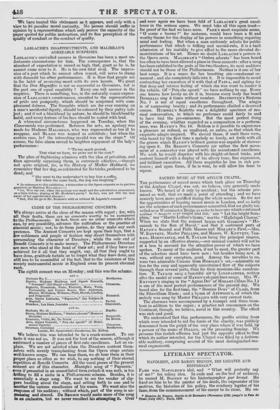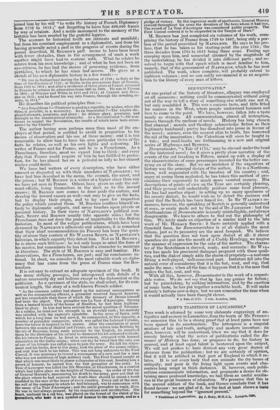LITERARY SPECTATOR.
NAPOLEON, AND BARON BIGNON, HIS LEGATEE AND HISTORIAN.*
FAME was NAPOLEON'S idol, and "What will posterity say of me ?" his ruling idea. In exile and on the bed of sickness, he named M. BIGNON as his historiographer par brevet. He fixed on him to be the painter of his deeds, the expounder of his motives, the 'historian Of his policy, the residuary legatee of his fame, from the commencement of his career to its close. He en-
• Histoire de France, depuis le 18 Brumaire (November 1799) jusqu'i la Pais de Tilsit (July 1807). Paris, 1830. joined him by his will " to write the history of 'French Diplomacy from 1792 to 1815 r not forgetting to leave him 400,000 francs by way of retainer. And a noble monument to the memory of the testator has been erected by the grateful legatee. . Vhe avenues to historical truth are intricate and manifold ; but from his constant employment as a diplomatist, and from his having generally acted a part in the progress of events during the period described, M. BIGNON'S path seems to have been beset with fewer obstacles, than in the arrangement of such a work another might have had to contend with. What he relates he relates from his own knowledge ; and of what he has not been an eye-witness, he has had the means of procuring evidence, from portfolios, to which he has since had access. He gives us a sketch of his own diplomatic history in a few words :— " He was in Switzerland during the Revolution of 1798; in Italy at the time of the disasters of 1799; at Berlin in the prosperous clays of Prussia, from 1800 to 1804; and after a residence of three years at Cassel, returned to Prussia to witness its adversities from 1806 to 1808. He was at Vienna in 1809; at Warsaw and Wilna in 1811 and 1812; at Cracow and Dres- den in 1813; and he found his way into France, through the invading ar- mies, in 1814." He describes his political principles thus :— "As a Republican ?—Whatever is good in a republic, he wishes, when the thing is possible, in a monarchy. As an Imperialist ?—The empire dis- played strength, greatness, and glory : he desires glory, greatness, and strength in the constitutional monarchy. As a Revolutionist ?—He con- tinues to respect the Revolution, the results of which have been conse- crated by the Charter."
The author having seen perhaps more than most of the em- ployes of that period, is entitled to credit in proportion to his means of observation and his use of those means ; and it is but reasonable to allow him to have his own particular views of the facts he relates, as well as his own lights and colouring. He writes of France and for France, and he is a Frenchman. As a Frenchman, therefore, must we expect him to think : and every duty that France could require of him he has fulfilled to perfec- tion, for he has placed her on a pedestal as lofty as her utmost wishes could desire.
We have had writers of every description, who have either amused or disgusted us with their anecdotes of NAPOLEON; we have had him -described in the camp, the council, the court, and the prison ; but M. Biorrox is a writer of a higher class than any we have yet seen in France. Others have given us only the out- ward effects, being themselves in the dark as to the inward causes ; M. BIGNON now comes to draw aside the curtain, and develop the inward causes as well—not only to give us the facts, but to display their origin, and to lay open for inspection the policy which created them. M. BIGNON confines himself en- tirely to diplomatic subjects, and never touches upon private or personal history. In their views of NAPOLEON'S political con- duct, SCOTT and Biostosr usually take opposite sides ; but the Frenchman does not deny the praise of impartiality to the British historian. In most of the vulgar publications, which have been devoured by NAPOLEON'S adherents and admirers; it is remarked that their chief recommendation (in France) has been the quan- tity of abuse they contain of Sir WALTER SCOTT, as NAPOLEON'S historian, in which capacity they detest him. Not so M. BIGNON; he is above such littleness : he not only keeps in mind the fame of his master, but remembers he has himself a character to maintain in literature. The style of M. BIGNON is easy and familiar. His observations, for a Frenchman, are just; and his conclusions ra- tional. In short, we consider it the most valuable work on diplo- macy that • has come from the press of France since the Res- toration.
It is not easy to extract an adequate specimen of the book. It bas many striking passages, but interspersed with details of a nature necessarily dry tedious except to the diplomatist or the politician. As a specimen of the style, we shall select, for its con- venient length, the story of a well-known French soldier.
"As the common soldier had shared in the national recompenses as well as the commanding officers, a grenadier received funeral honours, not less remarkable than those of which the memory of Desaix himself bad been the object. This grenadier was La Tour d'Auvergne. Sprung from a bastard branch of the house of Bouillon, he had been legitima- tized by glory. In him had been revived the moral qualities of Turenne. As a soldier, he tried not his strength in an elevated rank ; his modesty was satisfied with the captain's epaulette. In the army of Spain, with which for a long time he had served, he commanded, in this capacity, a number of grenadier companies, which was called the Infernal Column, from the terror it inspired in the enemy. After the conclusion of peace between the courts of Madrid and France, on his return into Brittany by the sea of Bayonne, being made prisoner by the English, he surprised them by the obstinacy of his refusal to dismount his tri-coloured cockade. On his return to France, he lived in retirement, occupied with learned researches on the Gallic origin ; when one day he heard that the only son of one of his friends was callectupon to join the army. He left his retire- ment and his books, flew to the army, took the place of the young soldier, and sent him back to his father. This was not long unknown to the First Consul. It was necessary to invent a recompense of a new sort for a man who was not ambitious of high military rank. The First Consul caught at that which was most likely to please a character of this cast. Sending him a sword of honour, he named him the first grenadier of the army. La Tour d'Auvergne was killed the 9th Messidor, at Oberhausen, in a combat which had taken place on the heights of Neubourg. An order of the day of General Moreau's, announcing his death to the army, gave out that on the place where he had received his death-blow should be raised a tomb conflded to the care of the brave of every country. Every call of the mus- ter-roll of the company to which he had belonged, was to cOmmence with the name of La Tour d'Auvergne ; and the oldest grenadier to reply, Here. He was in fact always present, by his inspirations and recollection. His /Wait, enclosed In a red box, was placed on the breast of the eldest of the IFenadiera, who bon it as a symbol of honour to the regiment, and as a
pledge of victory. By this ingenious mode of apotheosis, General Moreau revived throughout his army the devotion of the hero whom it had lost. The sword of La Tour d'Auvergne was considered public property. The First Consul ordered it to be suspended in the Temple of Mars."
M. BIGNON has just completed six volumes of his work, com- prising the history of France from 1799 to 1807, being only a por- tion of the period prescribed by NAPOLEON. He says in his pre- face, that he has taken as his starting-point the year 1785; the three decades from 1785 to 1815 being three mras. Finding age creeping upon him, and somewhat alarmed by the magnitude of the undertaking, he has divided it into different parts ; and re- solved to begin with that epoch which is most familiar to him, namely, that of the government of NAPOLEON, which he has now published. The work, when complete, will probably extend to eighteen volumes ; and we can safely recommend it as an acquisi- tion to the library of every man of letters.



























 Previous page
Previous page